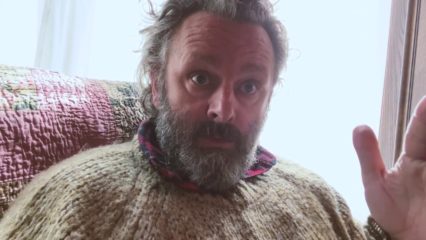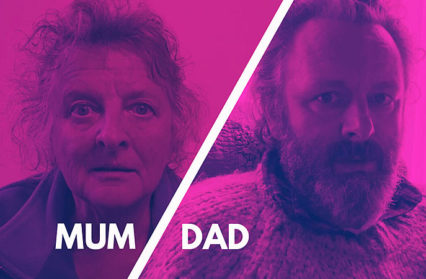Caragh Medlicott reviews an online double-header from the pen of Gary Owen and produced by Sherman Theatre, Mum & Dad.

I don’t think I have ever smuggled a play into my lunch break before. A theatre is an event, it can’t usually be nestled between your third to-do list item and a pack of prawn cocktail crisps. Except, of course, when in lockdown. The theatrical world, like other areas of the arts, has been forced to contort itself into new modes of existence. And yet, MUM & DAD is special because it isn’t compromised by its social distance format, but instead, liberated by it. Donated to the Sherman Theatre by acclaimed Welsh playwright Gary Owen, these monologues are ‘near-verbatim’ recollections of stories he was told by his mum and dad regarding their early lives in Pembrokeshire.
Split into two clips hosted on Sherman’s website, both mini-plays start with a message reminding audiences that they don’t have to turn off their phones as ‘you are probably watching this on it anyway’. I admit I had some reservations. It seemed inevitable that video would lack the gravity of monologues delivered on stage (while an actor’s performance can’t be salvaged by light and sound production, it can certainly be supplemented by it). But such thoughts were promptly quieted by the simple yet intimate framing of the shots, and more pressingly the scorching realism of the performances delivered by Lynn Hunter and Michael Sheen.
Monologues are always about voice, but here it is more specific; they orbit ideas surrounding the language of the family. The way our parents, with separate and individual histories, converge to become one in an ever-growing family tree. While MUM spans 18 minutes, DAD barely surpasses four. They have the odd, non-uniform shape of genuine anecdotes. Something Owen addresses in his note, stating: ‘they’re too little to ever be put on as theatre pieces, so it’s a huge threat to have them performed now.’
MUM recalls the story of mid-childhood and the negotiations of a father-daughter relationship. Hunter plays the part with a childlike temperament, swinging from giddy excitement to earnest disappointment; and still, the whole thing is tinged with a nostalgic longing (the kind that is so often imbued in the past tense), it’s the voice of a narrator who already knows how the story ends. It vividly captures the emotions of childhood; that excitement ‘going cold’ in your throat when caught out and told off, a determination not to cry, the inevitable tears during a makeup over milky tea and bread and butter. It’s a nod to the shaping of a person, how every parent or guardian leaves their print on the next, the way those fingerprints accumulate so that each child is touched by countless generations, even those long since gone.
In DAD, Sheen captures the halting voice of a working man embarrassed to tell what amounts to a supernatural tale. Sentences slope towards a feeling, only to be pulled up by a ‘well, you know’. Like MUM, it has the anxiety of a story already mythologised. That nagging that rankles when you’ve shared a memory too many times – but also the feeling of determination, bordering on desperate, to convey now how you felt then. DAD is a secret past its embargo; a voice quick to remind the listener that at the time he didn’t tell anyone. It’s understated yet trusting, a tale recounted with one purpose: to be remembered.
If you were to ask a grandparent about a conversation they had with one of their grandparents, you’d get a sense of how fast centuries can unravel, and how quickly time – well, generations – can fall away. Yet what Owen’s MUM & DAD reminds us is that vibrancy of voice is what truly sparks our memories and stops lives from being boiled down to mere milestones. We know that our days are full of moments messy and miscellaneous, and more often than not it is these stories that make up the substance of our life (and what we recollect of it). Not necessarily because they were our most eventful experiences, but because they were poignant.
There are future performances from Sherman Theatre available here.
Caragh Medlicott is an avid contributor to Wales Arts Review.



 Enjoyed this article? Support our writers directly by buying them a coffee and clicking this link.
Enjoyed this article? Support our writers directly by buying them a coffee and clicking this link.








